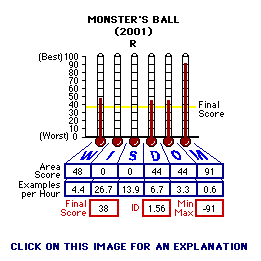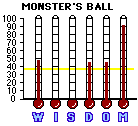SUMMARY / COMMENTARY:
| If Scriptural references appear, the full text appears at the end of the Summary / Commentary likely using a mix of KJV and NIV. |
MONSTER'S BALL (R) -- ...and about finding peace (though guarded) and richness (though vain) in the most unethical place.
Distributed by: Lions Gate Films
Director(s): Marc Forster
Producer(s): Milo Addica, Michael Burns, Lee Daniels, Eric Kopeloff
Written by/Screenplay: Milo Addica, Will Rokos
Cinematography/Camera: Roberto Schaefer
Music: Chris Beaty, Thad Spencer, Richard Werbowenko
Film Editing: Matt Chesse
Casting: Kerry Barden
Mark Bennett, Billy Hopkins, Suzanne Smith
Production Design: Monroe Kelly
Art Direction: Leonard R. Spears
This is the Billy Bob Thornton and Halle Berry show. And "show" them it does. All of them. And I mean all of them. Monster's Ball does have some things to say about racism, though not good in context, and about finding peace (though guarded) and richness (though vain) in the most unethical place: in immorality not in wholesomeness. God's many admonitions against sexual immorality may be summed up as any sexual contact (including visual), conduct or activity outside of a monogamous heterosexual marriage is sinful.
Billy Bob Thornton is Hank Grotowski, a high ranking department of corrections officer well respected by his peers. Being quite regimented and forceful in his dispelling of justice, Hank Grotowski is the epitome of not what a father should be. "Yeah. I hate you. I always did" to his adult son Sonny Grotowski (Heath Ledger), also a corrections officer who then committed suicide in front of his father and growly and likewise rigid grandfather, Buck Grotowski (Peter Boyle), a retired corrections officer.
Hank has been charged with the duties of executing cop-killer Lawrence Musgrove (Sean Combs). During the execution procession Sonny launches his lunch and daddy Hank beats him for messing up the procession, because Sonny is "weak." Then is when we are shown the suicidal few minutes of the very few Ledger has in the show. Enters Leticia Musgrove (Halle Berry) who hated her husband, Lawrence. Also enters their incredibly overweight son, Tyrell (Coronji Calhoun) who adored his father. Leticia is not at all kind to Tyrell. She beats him for sneaking candy and other fat foods. In one case, Leticia escorts her son to somewhere without a car and Tyrell becomes a victim of hit and run. Finding the mother and son pair on the roadside, Hank comes to the rescue and transports them to the hospital. By this time, Hank had resigned as a correctional officer but aided investigations into the boy's death by his experience in law enforcement investigations.
Both Hank and Leticia are suffering tragedies in their lives and both are desperate for respite. Hank longing for escape from quilt because of his son's suicide and Leticia longing for relief from the grief of her husband's execution and her son's death. Hank tries to find relief through resigning the force and through a hooker. He also buys a little gas station. Leticia lets rage manifest in her. Coincidence such as the episode of transporting Leticia and Tyrell to the hospital forces Hank and Leticia together, eventually intimately - very intimately - as if to say sex is the inevitable goal of any such relationship. All too often it is. Just like in the movies. Maybe the movies will get it right someday and present sex as the tool of heterosexual marriage it is rather than as the reason for existence.
While there are some statements made in Monster's Ball worthy of ponder, there is much to likely offend the wholesome or Christian viewer, adolescent or adult. There is much nudity during and outside of intercourse plus other sexual vulgarities, much foul language and other matters violating Phil. 4:8 and Ps. 101:3. Many will argue that this is just entertainment: that it is just acting [Prov. 30:12]. May this service provide for these folks an understanding that though a pretense, such demonstration of sins places a stumbling block in the path of the viewer. An influence does not have to be real to influence [1Cor. 8:9]. Recall if you will two things: 1) Dartmouth University found that in their survey population only 16% of 5th to 8th graders were restricted from R-rated movies, and 2) that Jesus is very clear about His feelings about teaching and/or causing His little ones (which includes at-home teens) to sin [Luke 17:2].
I can't figure out why this movie is apparently so popular.
The listing in the Findings/Scoring section, the heart of the CAP analysis model, reveals all that was noted.
ooooooooooooooooooooooooooooooooo
SCRIPTURAL APPLICATION(S)
If needed to focus or fortify, applicable text is underlined or bracketed [ ]. If you wish to have full context available, the Blue Letter Bible is a convenient source. If you use the Blue Letter Bible, a new window will open. Close it to return here or use "Window" in your browser's menu bar to alternate between the CAP page and the Blue Letter Bible page.
Phil. 4:8 and Finally, brethren, whatsoever things are true, whatsoever things are honest, whatsoever things are just, whatsoever things are pure, whatsoever things are lovely, whatsoever things are of good report; if there be any virtue, and if there be any praise, think on these things.
Ps. 101:3 I will set no wicked thing [worthlessness, ruin, destruction] before mine eyes: I hate the work of them that turn aside [cause to swerve, to fall away]; it shall not cleave to me [cling, stick, stay close to me, influence me].
Prov. 30:12 There is a generation that are pure in their own eyes, and yet is not washed from their filthiness.
1 Cor. 8:9 But take heed lest by any means this liberty of yours [exousia {ex-oo-see'-ah}: power of choice, of doing as one pleases, e.g., to make movies] become a stumblingblock [proskomma {pros'-kom-mah}: by which is caused to sin] to them that are weak [astheneo {as-then-eh'-o}: feeble, powerless, as in ill-equipped, inexperienced or inadequately informed to process sin as sin.].
*******Food for Thought*******
1 Cor. 15:33 (KJV) Be not deceived: evil communications corrupt good manners. (NIV) Do not be misled: Bad company corrupts good character.
Jude 4 For certain men* whose condemnation was written about long ago have secretly slipped in among you. They are godless men, who change the grace of our God into a license for immorality and deny Jesus Christ our only Sovereign and Lord. [*men: anthropos {anth'-ro-pos}, generic, a human being, whether male or female]
Matt. 25:40 And the King shall answer and say unto them, Verily I say unto you, Inasmuch as ye have done it unto [or for] one of the least of these my brethren, ye have done it unto [or for] me.
Luke 17:2 It would be better for him to be thrown into the sea with a millstone tied around his neck than for him to cause one of these little ones to sin. [cause by teaching or example]
Ps. 119:133 Direct my footsteps according to your word; let no sin rule over me.
John 14:15 If ye love me, keep my commandments.
1 Thess. 5:22 Abstain from all appearance of evil.
ooooooooooooooooooooooooooooooooo
As always, it is best to refer to the Findings/Scoring section -- the heart of the CAP analysis model -- for the most complete assessment possible of this movie.
|
|
FINDINGS / SCORING:

Wanton Violence/Crime (W):
firearm threat to kids
reckless firearm discharge
preparations for electrocution
firearm threat to father by son with beating
theft
traffic fatality - child
Impudence/Hate (I)(1):
34 uses of the three/four letter word vocabulary
nine uses of the most foul of the foul words
racial hatred, slurs and bigotry
mother's physical abuse of overweight son
extreme abuse of adult son by a father
"Yeah. I hate you. I always did" by a father to his son
placing invalid father in a home to get rid of him
Sex/Homosexuality (S):
nudity, repeatedly
prostitution with nudity
intercourse with nudity, repeatedly
stripping for intercourse
inappropriate touch, repeatedly
request for sex
adults in underwear
cohabitation for sex
sex talk, comments
man and woman in bed together for sex
sexual vulgarity
open face kissing
oral sex with sounds and nudity (male genitals unseen)
Drugs/Alcohol (D):
smoking, repeatedly
drinking, repeatedly
drunkenness
Offense to God (O)(2):
6 uses of God's name in vain with the four letter expletive and none without it
Murder/Suicide (M)(3):
suicide by gunfire - graphic
|















